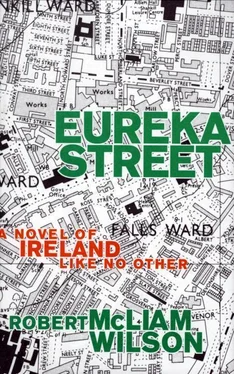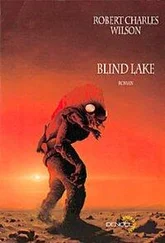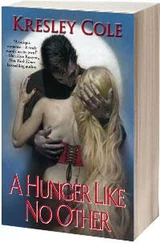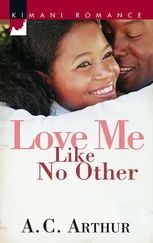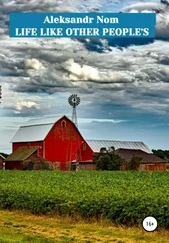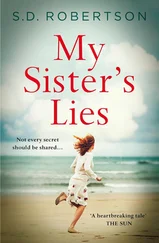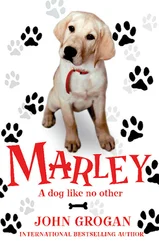Posters and billboards flap in a hundred little winds. They proclaim concerts, religious meetings, theatres, religious meetings, consumer goods and religious meetings. On Brunswick Street a ragged orange poster flaps. `The Reverend Ramsden's Travelling Cathedral & Disco, Formal Dress, No Catholics', it says.
On some poles, flags perch. From some windows they hang, upon the tops of certain tower blocks they flutter, these flags. There are a thousand flags, but five mere colours and only two designs. Green, white, gold, red and blue. The two three-coloured emblems of difference.
Throughout the city, bunches of flowers lie. They are grouped on pavements, in doorways or they are wedged between railings. The city is dotted with these false little gardens. The flowers bright and new in their wrapping paper, or weary and wilting with age. Any long walk through the city takes you past one or more of these sites. The citizens have placed these flowers on the spots where other citizens have been murdered. If the flowers are old, you pass and wonder who died there.You always fail to remember.
It is only late at night, if you stand up high, that you can see the city as one thing, as a single phenomenon. While all sleep, the daytime jumble is unified and, geographically at any rate, the city seems a single thing.You can see it ringed by its circles of black basalt, mountains, cliffs and can see the dark sea in the wide bay lapping right up to the foot of the metropolis, wetting its very heart.
You can see that Belfast is, quite literally, a dump. Its core is built on level land that simply wasn't there two hundred years before. Earth was dumped into the sea and Belfast was built there. Slob land, reclamation. The city is a raised beach, an abutment. The townsfolk say it rose from the water like some god but the truth is that it was dumped in the sea but didn't sink.
Belfast is Rome with more hills; it is Atlantis raised from the sea. And from anywhere you stand, from anywhere you look, the streets glitter like jewels, like small strings of stars.
Some say it is a city of 179,000 people, 130,000 men and 149,000 women, and that these people are squashed into 11,489 hectares. Some say that there are half a million souls Belfast is Belfast too. Two cathedrals, some docks, a harbour, many hills and mountains. A sea-level town on the lip of the land.
However many, whatever size, it is magical. This night, the streets smell stale and tired, the air is full of regret and desire. Time seems passing and passed. The city feels how it feels to grow old.
However magical or glittering, you can read the signs.You have seen the flags, the writing on the walls and the pavement flowers. This is a city where people are prepared to kill and die for a few pieces of coloured cloth. These are the standards of two peoples with a four- or eight-hundred-year-old difference, national and religious. It is an illogic, a conundrum that corrupts the blood here. There is no revolution, only deadly convolution.
But deep at night Belfast whispers in cool breaths that hatred is something like God.You can't see what you can't see, but if you fight and follow it blindly enough, it will keep you warm at nights.
As your eye roams the city (as your eyes must, as our eyes, those democratic unideological things, always will, giving witness, testimony), you see that there is indeed a division in the people here. Some call it religion, some call it politics. But the most reliable, the most ubiquitous division is money. Money is the division you can always put your money on.
You see leafy streets and you see leafless streets.You can imagine leafy lives and leafless ones. In the plump suburbs and the concrete districts your eyes see some truths, some real difference. The scars and marks of violence reside in only one type of place. Many of the populace seem to live well. Many prosper while many suffer.
Belfast is a city that has lost its heart. A shipbuilding, ropemaking, linen-weaving town. It builds no ships, makes no rope and weaves no linen. Those trades died. A city can't survive without something to do with itself.
But at night, in so many ways, complex and simple, the city is proof of a God. This place often feels like the belly of the universe. It is a place much filmed but little seen. Each street, Hope, Chapel, Chichester and Chief, is busy with the moving marks of the dead thousands who have stepped their lengths. They leave their vivid smell on the pavements, bricks, doorways and in the gardens. In this city, the natives live in a broken world — broken but beautiful.
You should stand some night on Cable Street, letting the little wind pluck your flesh and listen, rigid and ecstatic, while the unfamous past talks to you. If you do that, the city will stick to your fingers like Sellotape.
Whether in the centre itself or the places in which people put their houses, the city's streets, like lights in neighbours' houses, are stories of the done, the desired, the suffered and unforgotten.
The city's surface is thick with its living citizens. Its earth is richly sown with its many dead. The city is a repository of narratives, of stories. Present tense, past tense or future. The city is a novel.
Cities are simple things. They are conglomerations of people. Cities are complex things. They are the geographical and emotional distillations of whole nations. What makes a place a city has little to do with size. It has to do with the speed at which its citizens walk, the cut of their clothes, the sound of their shouts.
But most of all, cities are the meeting places of stories. The men and women there are narratives, endlessly complex and intriguing. The most humdrum of them constitutes a narrative that would defeat Tolstoy at his best and most voluminous.
The merest hour of the merest day of the merest of Belfast's citizens would be impossible to render in all its grandeur and all its beauty. In cities the stories are jumbled and jangled. The narratives meet. They clash, they converge or convert. They are a Babel of prose.
And in the end, after generations and generations of the thousands and hundreds of thousands, the city itself begins to absorb narrative like a sponge, like paper absorbs ink. The past and the present is written there. The citizenry cannot fail to write there. Their testimony is involuntary and complete.
And sometimes, late at night, when most sleep, as now, the city seems to pause and sigh. It seems to exhale that narrative, to give it off like the stored ground-heat of a summer day. On such nights, you cross a city street and for a few golden minutes there are no cars and the very hum of distant traffic fades and you look at the material around you, the pavements and street-lamps and windows, and if you listen gently, you might hear the ghosts of stories whispered.
And there is magic in this, an impalpable magic, quickly gone. It is at these times that you feel you are in the presence of something greater than yourself. And you are. For as you look around the perimeter of your illuminated vision, you can see the buildings and streets in which a dark hundred thousand, a million, ten million stories as vivid and complex as your own reside. It doesn't get more divine than that.
And the sleepy murmurings of half a million people combine to make an influential form of noise, a consensual music. Hear it and weep. There is little more to learn on the earth than that which a deserted city at four in the morning can show and tell. Those nights, those cities are the centre, the fulcrum, the very wheel upon which you turn.
Sleeping cities and sleeping citizens alike wait upon events, they attend upon narrative. They are stopped in station. They soon move on, they soon start again.
And as the darkness begins to curl around its edges, the city shifts and stumbles in its slumber. Soon it will wake. In this city, as in all cities, the morning is an assault. The people wake and dress themselves as though arming themselves for their day. From all the small windows of all the small houses on the small streets of this little city, men and women have looked out on first-light Belfast and readied themselves to do battle with this place.
Читать дальше
